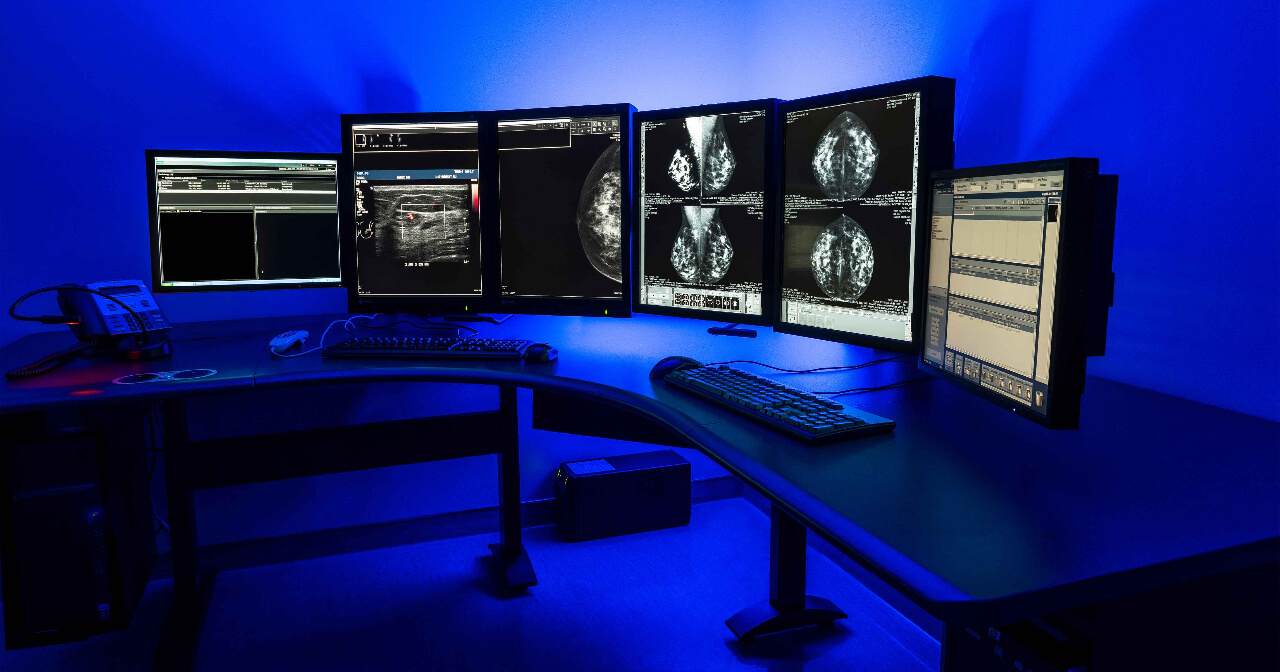
We collect basic website visitor information on this website and store it in cookies. We also utilize Google Analytics to track page view information to assist us in improving our website.

In the radiology industry, everything hinges on precision and efficiency.
The accuracy of diagnoses and the timely delivery of critical medical information rely heavily on the capabilities of radiologists. Yet, often overlooked is the role that ergonomics plays in maintaining the well-being and productivity of these healthcare professionals.
In this blog post, we will explore the critical importance of ergonomic workstations and monitor configurations tailored specifically for radiology reading rooms. The right setup can not only enhance comfort but also significantly improve the diagnostic accuracy and overall workflow of radiologists, making a profound impact on patient care.
At RedRick Technologies, we design and develop ergonomic workspaces for healthcare professionals that include workstations, monitor mounting solutions, accessories, and peripherals. We also provide ergonomic design services that help organizations implement ergonomic principles for improved space design and functionality. Get in touch and let’s find ways to improve the ergonomic functionality of your workspace.
Ergonomics, the science of designing and arranging our workspaces to our physical capabilities and limitations, is very important in today's fast-paced, technology-driven world.
Beyond comfort, ergonomics enhance both user well-being and productivity.
A well-designed ergonomic environment helps prevent long-term health issues by reducing the risk of musculoskeletal disorders such as repetitive strain injuries and back pain.
It optimizes work efficiency by minimizing physical strain, allowing individuals to focus on their tasks without the distraction of discomfort or fatigue.
In the radiology industry, ergonomic principles foster a healthier and more productive workforce, leading to improved job satisfaction, lower absenteeism, and, ultimately, better quality work. The same principles apply across multiple industries.
The benefits of ergonomic workstations show the positive impact that they can have on radiology diagnostics, benefiting both the radiologists and the patients they serve. Here are a few to keep in mind:
Improved Comfort: Ergonomic workstations are designed to allow radiologists to adjust desk height, monitor height and distance to accommodate proper posture and change of position, reducing physical strain during long hours of image interpretation.
Enhanced Diagnostic Accuracy: By minimizing discomfort and distractions, ergonomic workstations help radiologists maintain their focus and concentration, which is crucial for accurate diagnosis, especially in cases where subtle details matter.
Increased Workflow Efficiency: Ergonomic setups optimize the placement of monitors, keyboards, and mice, streamlining the radiologist's workflow. This leads to quicker access to patient data and more efficient navigation through medical imaging software.
Reduced Fatigue: Ergonomically designed workstations promote better posture, reducing the risk of fatigue and discomfort during prolonged reading sessions. This results in radiologists remaining alert and less prone to errors.
Lower Risk of Musculoskeletal Issues: Proper ergonomic design minimizes the risk of musculoskeletal problems, such as back pain and carpal tunnel syndrome, which can be debilitating and lead to medical leave, ultimately impacting patient care.
Enhanced Collaboration: Ergonomic workstations often allow for multiple monitors and adjustable configurations, facilitating collaboration among radiologists and other healthcare professionals by enabling the sharing of images and insights.
Increased Job Satisfaction: Improved comfort and reduced physical strain contribute to higher job satisfaction among radiologists, potentially improving staff retention rates and overall workplace morale.
Cost Savings: While ergonomic workstations may represent an initial investment, the long-term cost savings from reduced healthcare expenses and increased productivity can be substantial, making them a financially prudent choice for healthcare institutions.
There is no need to flip through a catalogue. Every RedRick proposed solution is specifically created and customized to meet your needs. Our thoughtfully designed products are adjustable, intuitive, and extremely robust, ensuring prolonged comfort and productivity.

Our approach centers around flexibility and customized solutions. We recognize that every situation is unique, and our goal is to create spaces that perfectly fit your needs. Our guiding principle is prioritizing ease of use – a crucial aspect in all our designs. We specialize in seamlessly integrating ergonomic adjustments into even the most complex environments, like radiology reading rooms.
Our expertise lies in making these spaces user-friendly and effortlessly adaptable, ensuring that professionals can work comfortably and efficiently, no matter how challenging the setting.
Height adjustable desktop (standard/critical feature)
Our recommended/standard range of adjustment is 24-49.5” above the floor
ANSI BIFMA standard of 22-48” is also available
The size and shape of a desktop are limitless and determined by physical space available, computer hardware to be hosted, and user preference.
Height adjustment (standard/critical feature)
Motorized height adjustment providing 12” of vertical range
All monitors adjust simultaneously
Virtually any monitor configuration can be accommodated
Focal distance adjustment (standard/critical feature)
Effortless manual adjustment, found to be the most intuitive and easy-to-engage method, providing 16” of horizontal forward/back range as well as 60 degrees of side-to-side swivel
Virtually any monitor configuration can be accommodated
Our monitor mounts can handle the heaviest monitor setups. These monitor mounts are designed to accommodate large, high-resolution displays and multiple screens for demanding tasks.
Unlike traditional “split-level” or “keyboard tray” models, RedRick’s mounts allow for single-work-surface solutions that retain maximum useable space while providing superior, intuitive, and easy ergonomic adjustment.
At RedRick Technologies, we design and develop ergonomic workspaces for healthcare professionals that include workstations, monitor mounting solutions, accessories, and peripherals. We also provide ergonomic design services that help organizations implement ergonomic principles for improved space design and functionality. Get in touch and let’s find ways to improve the ergonomic functionality of your workspace.